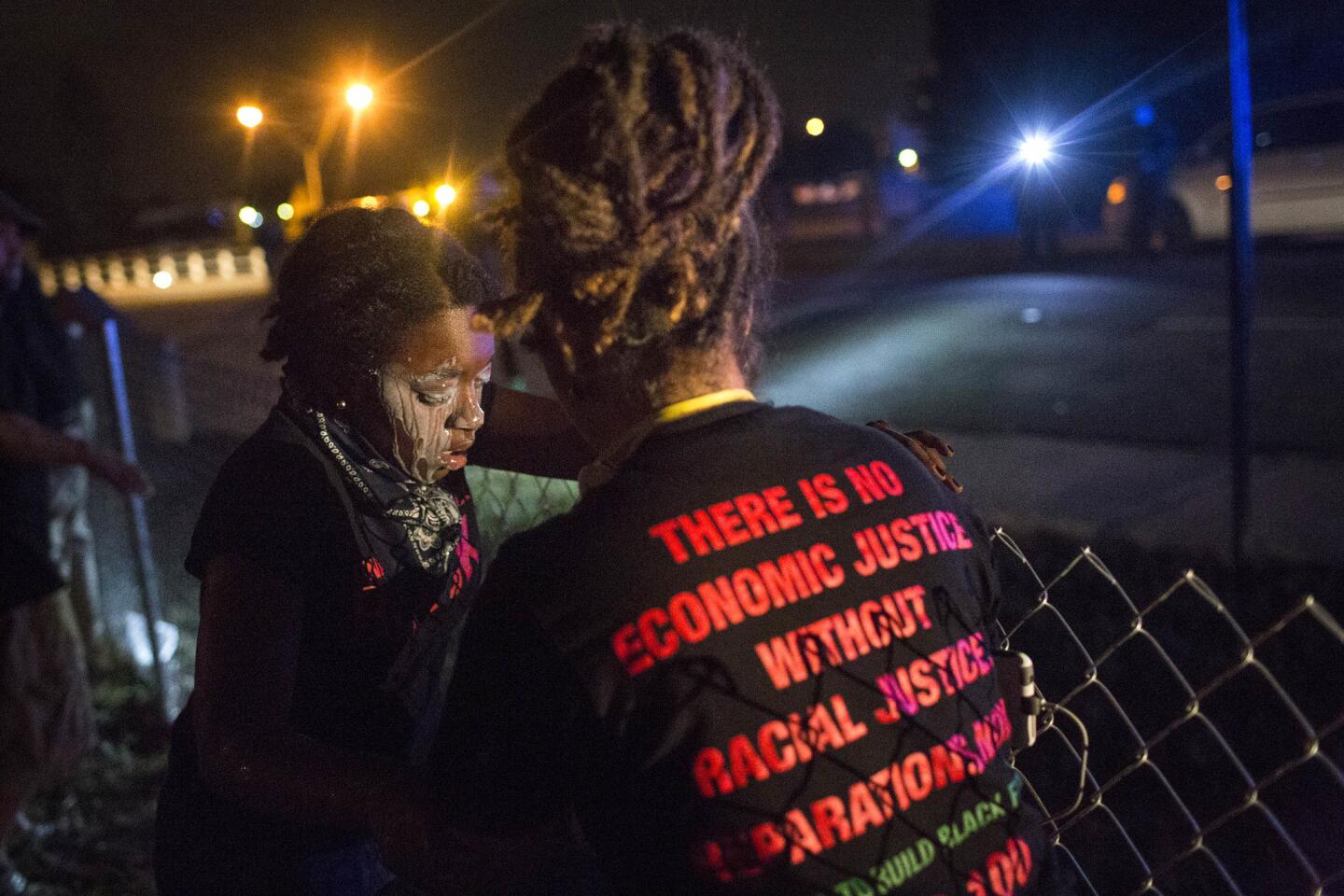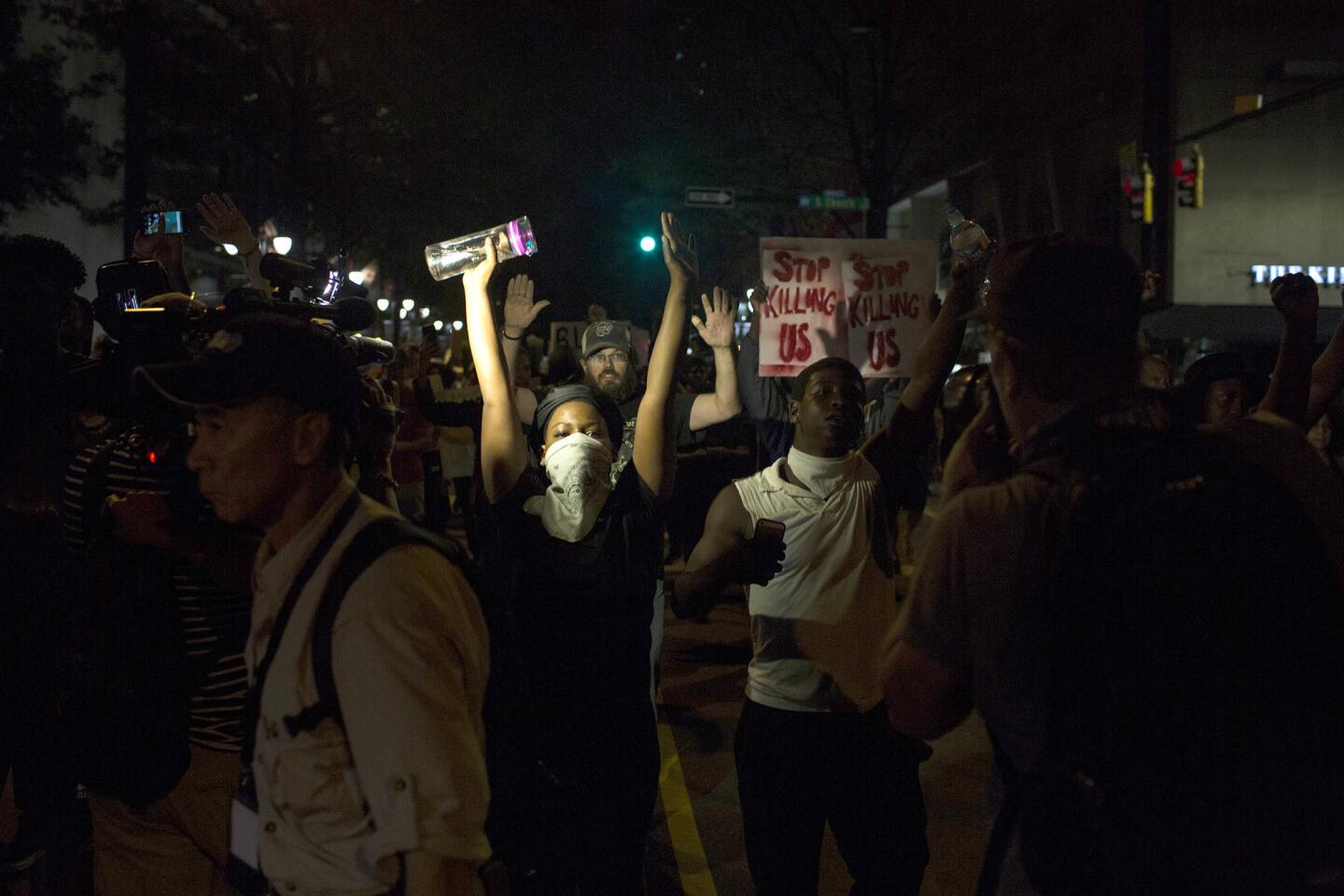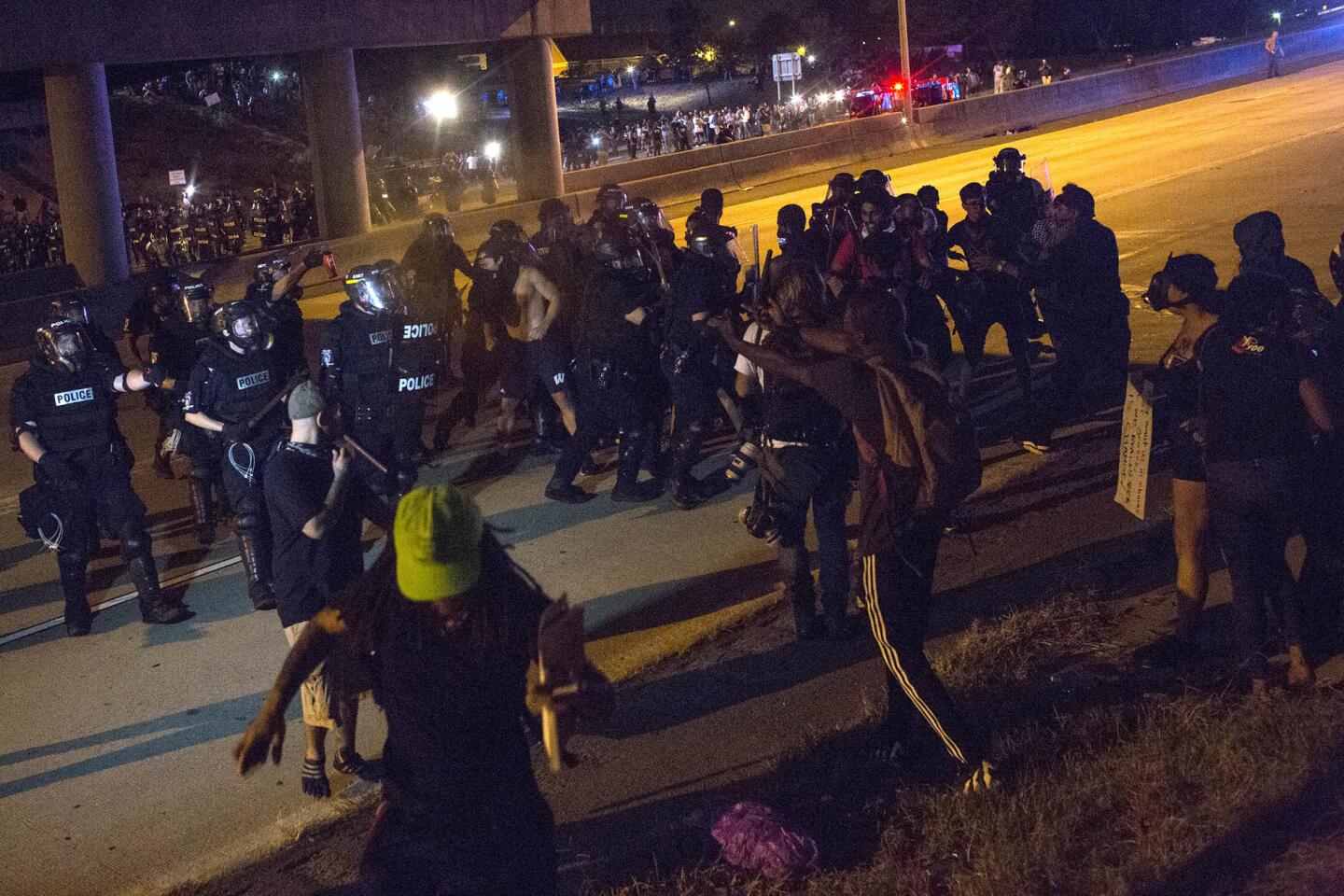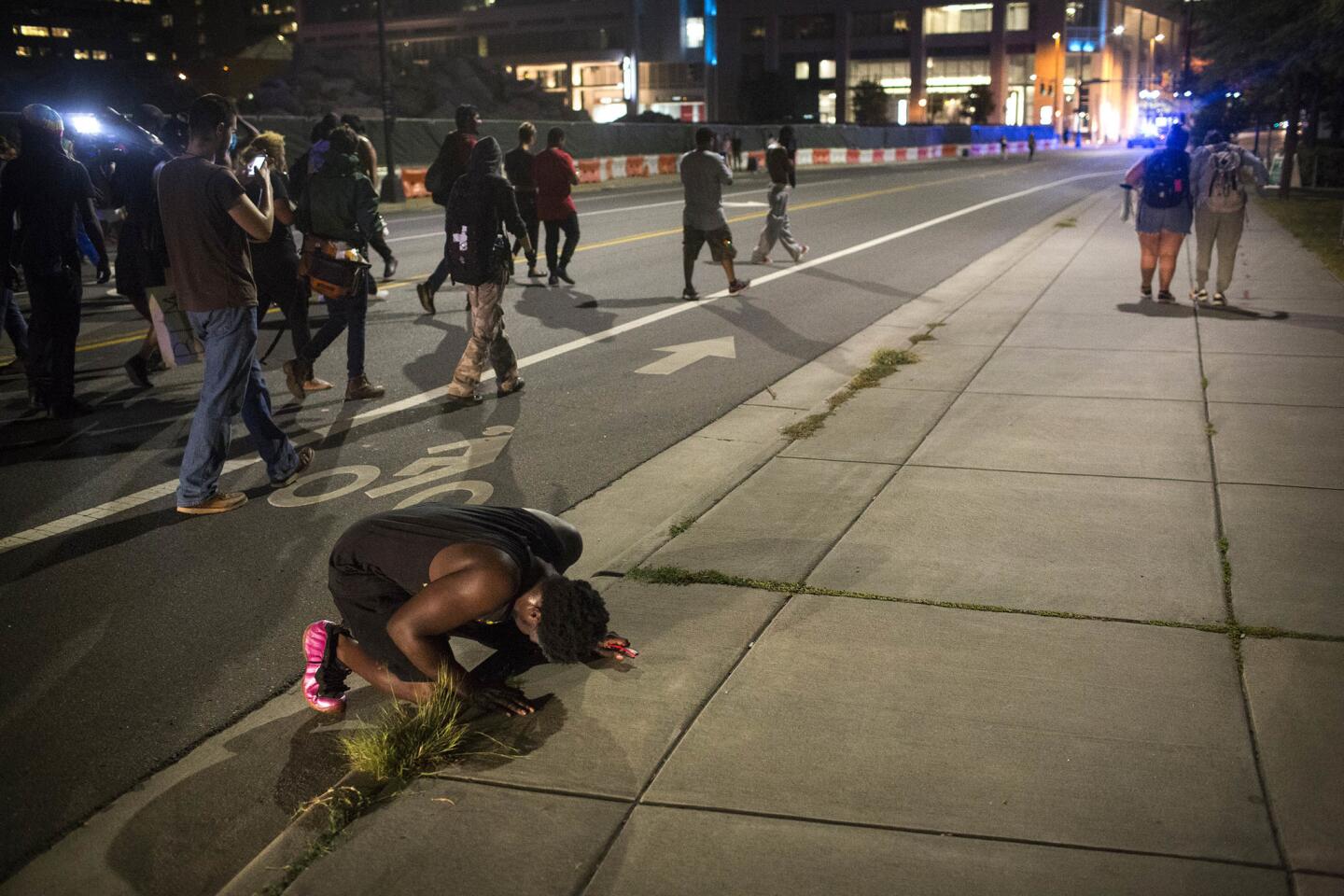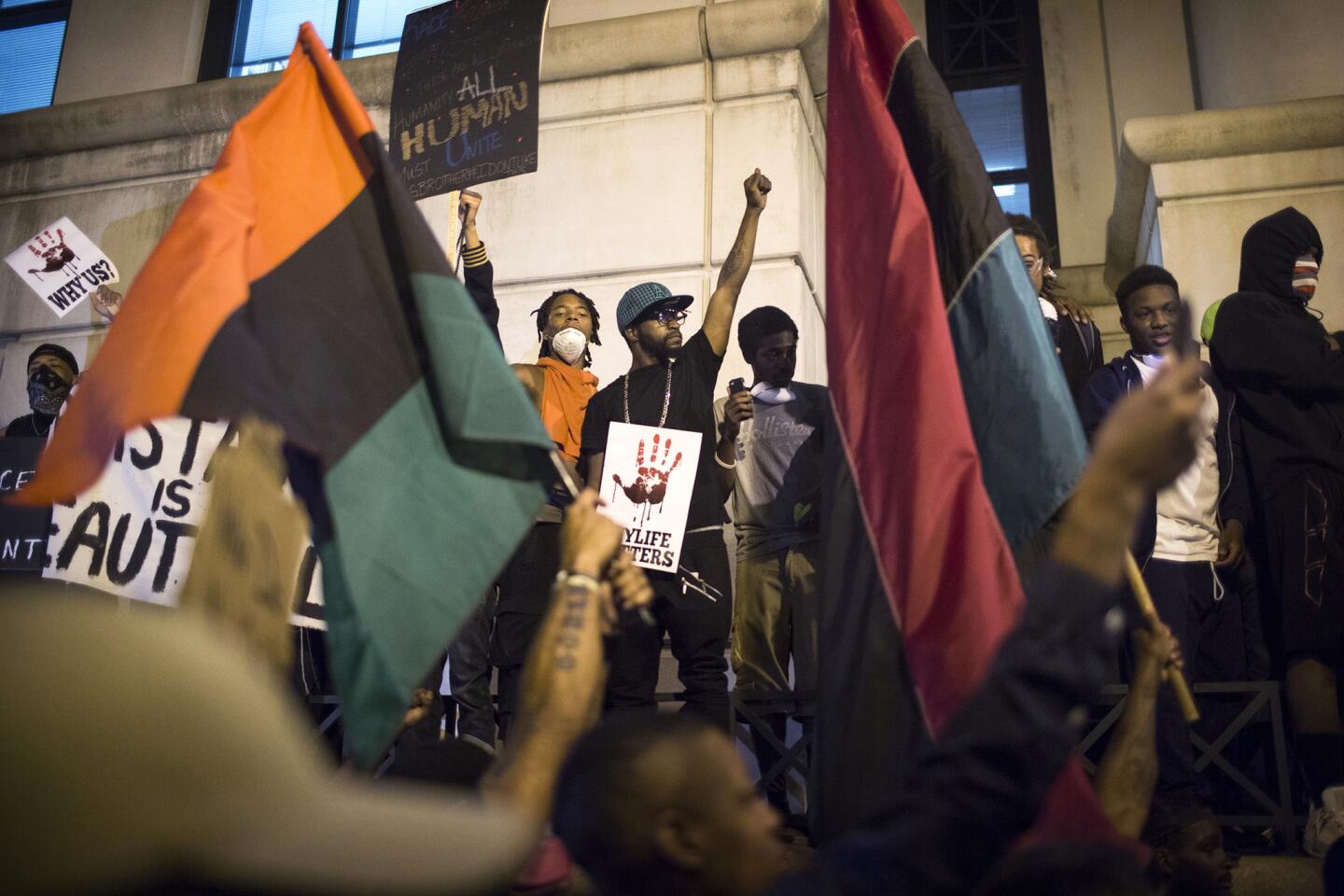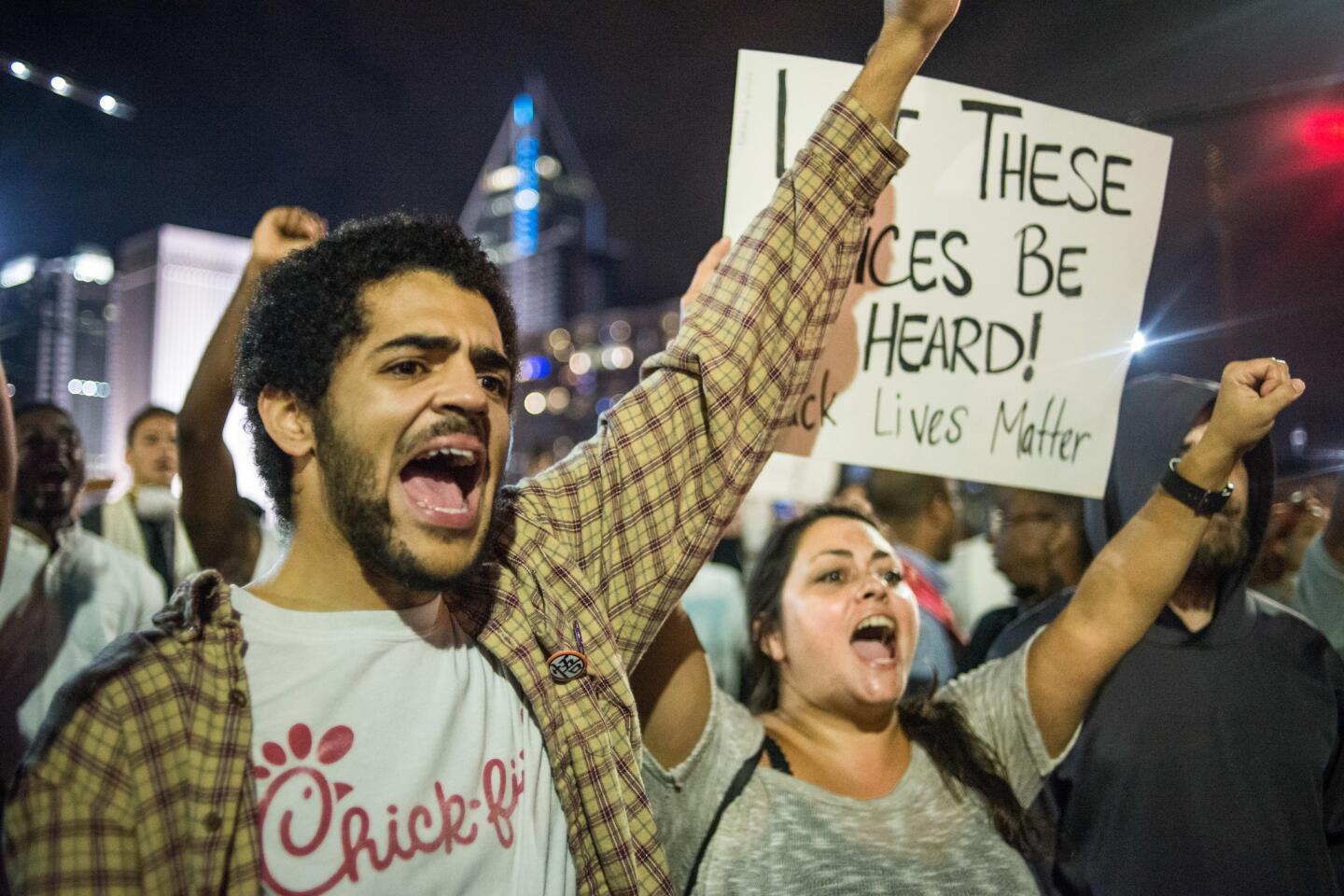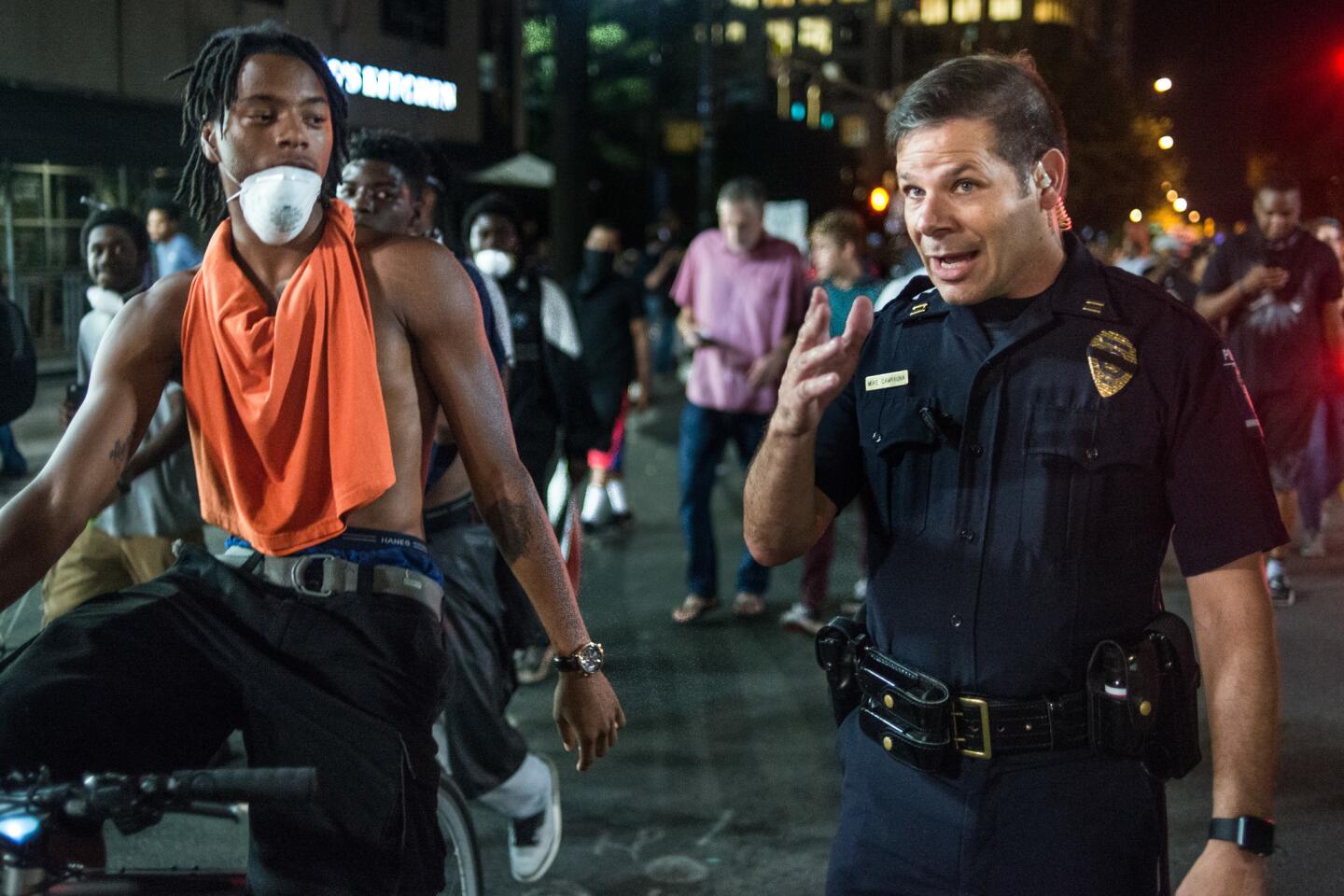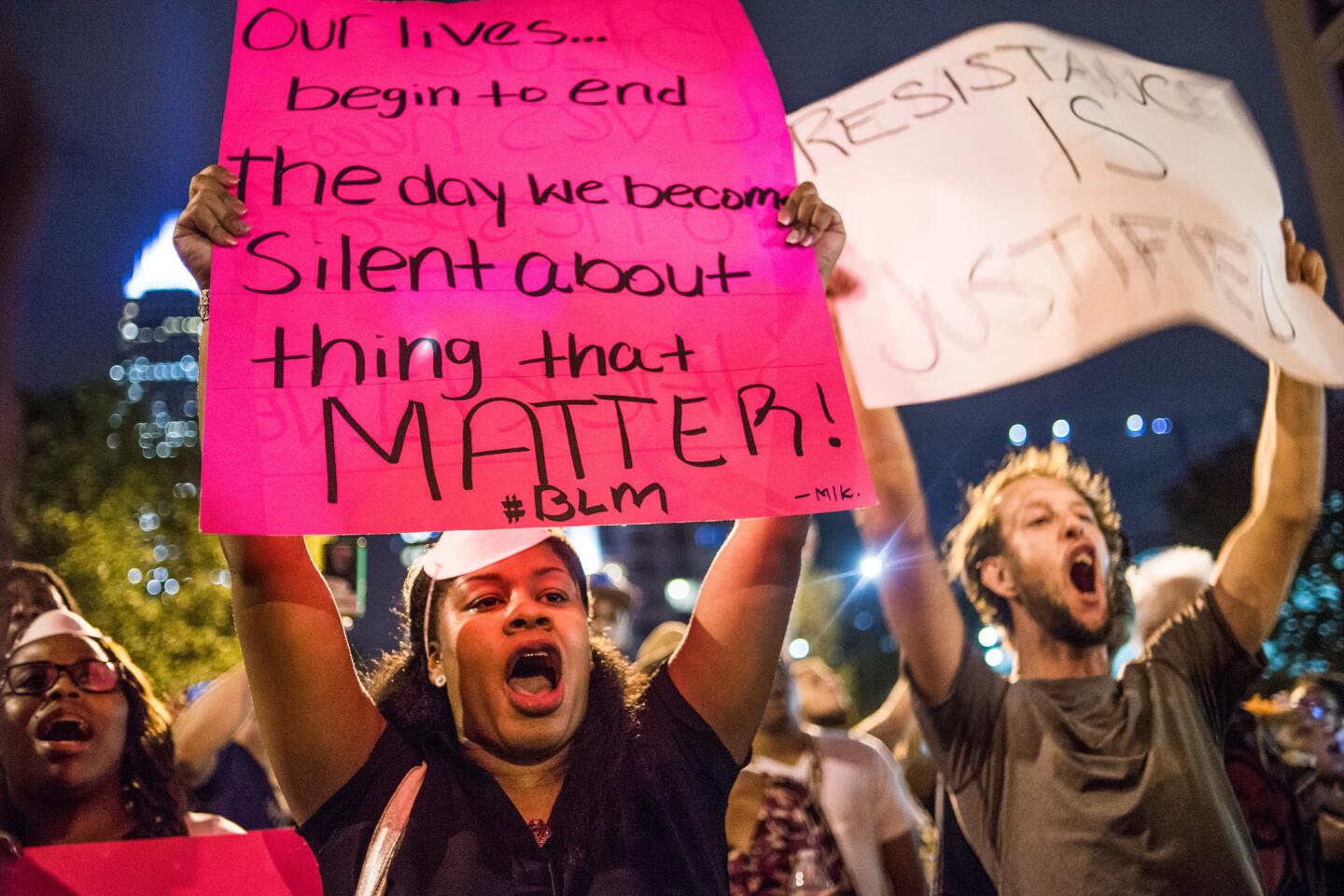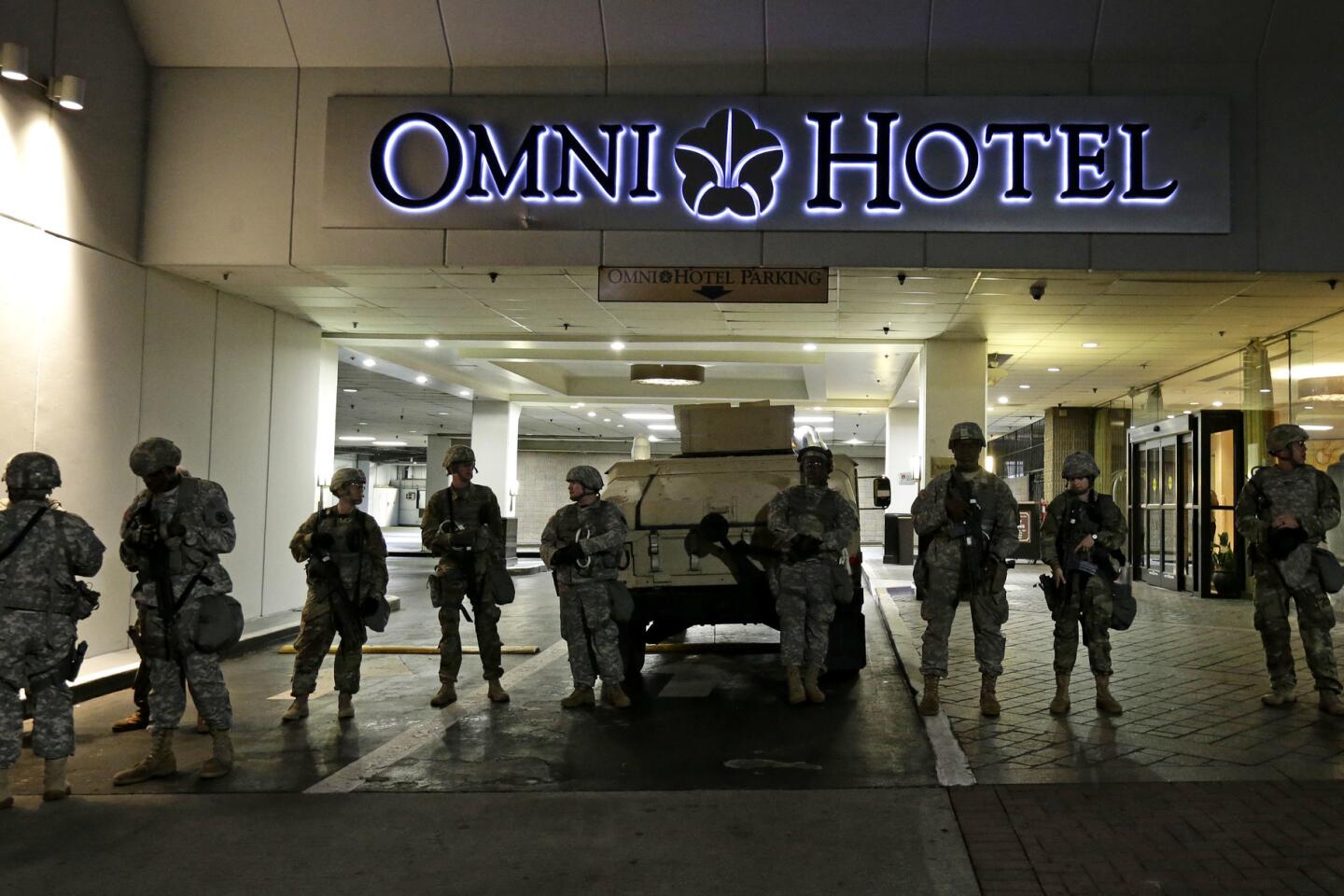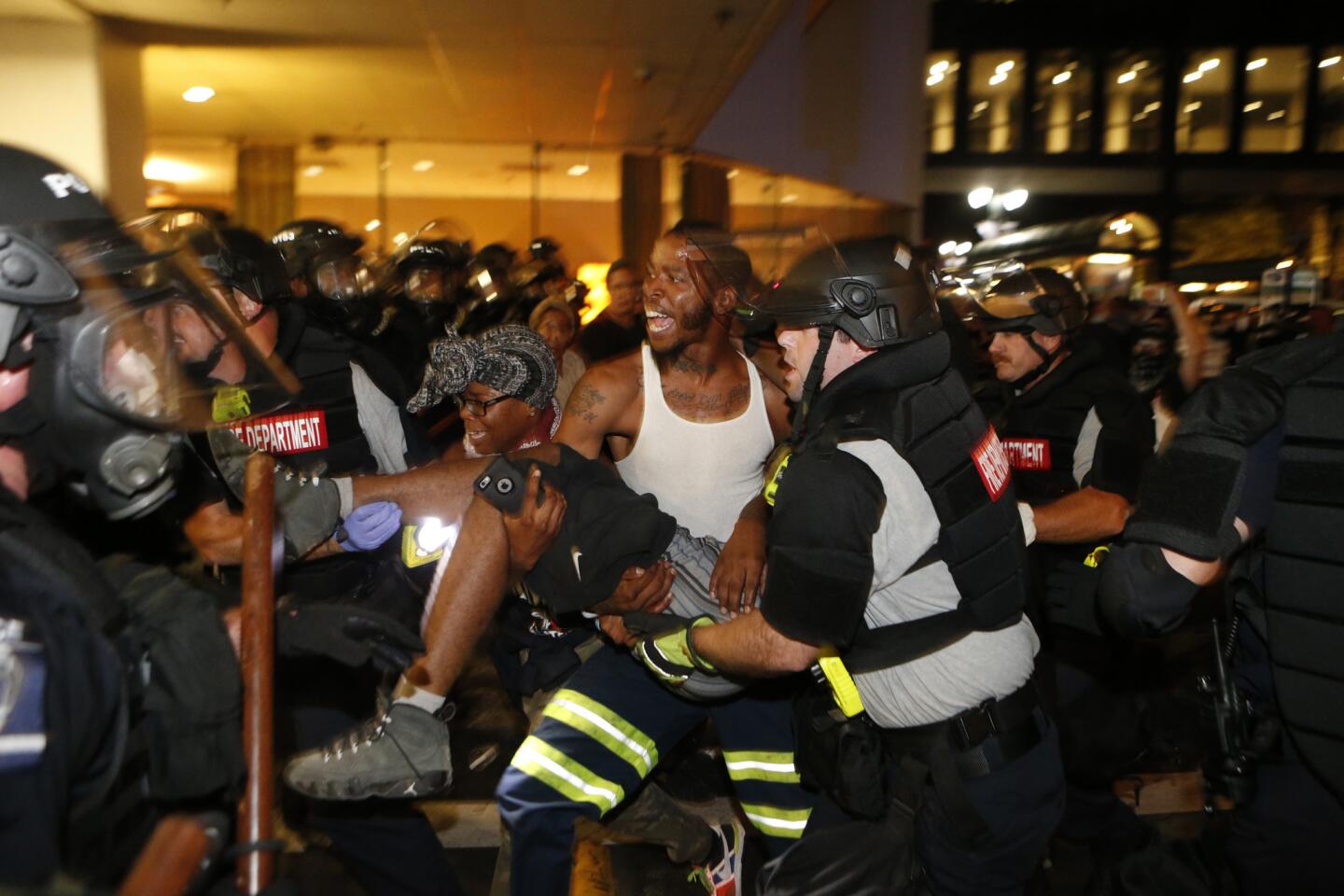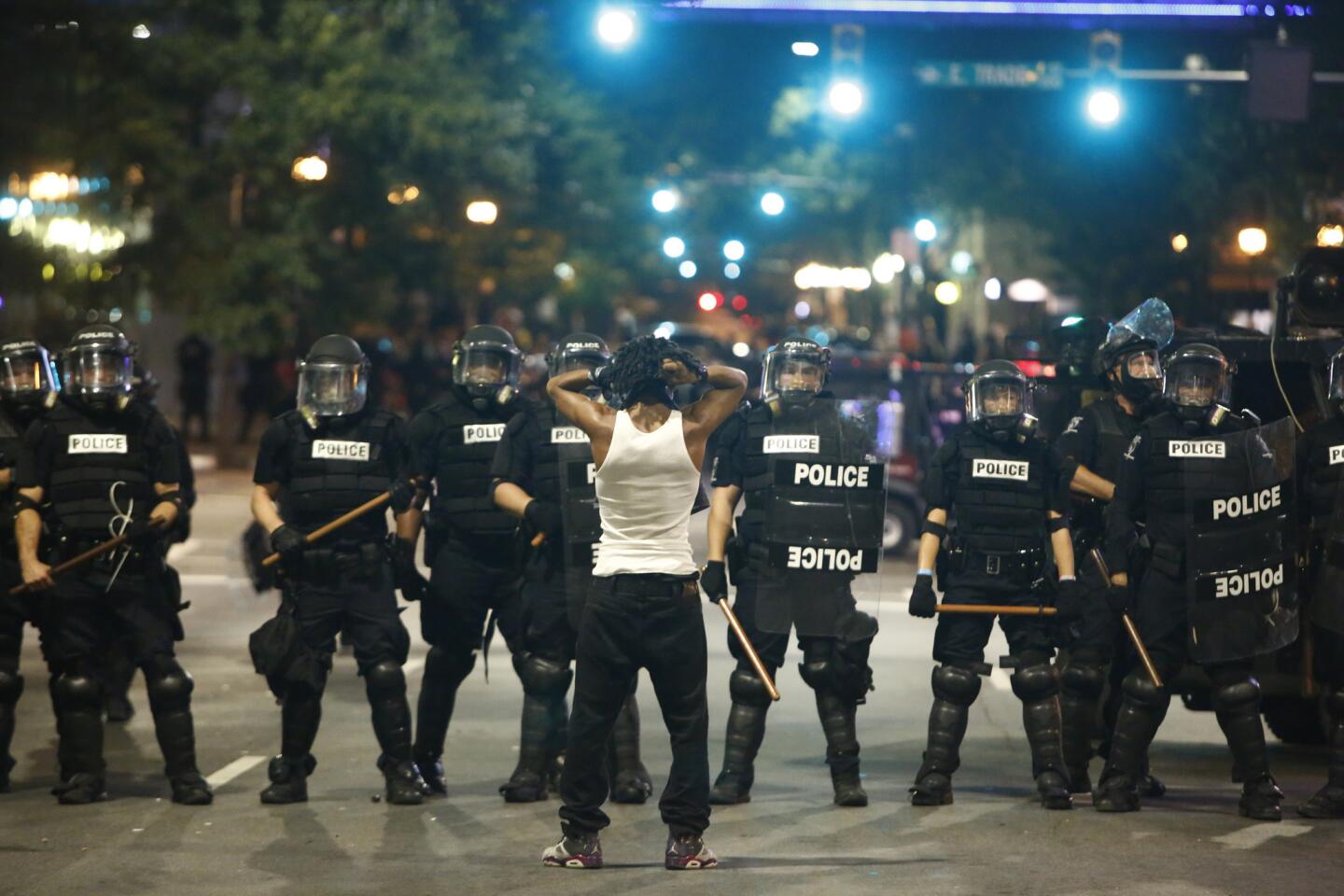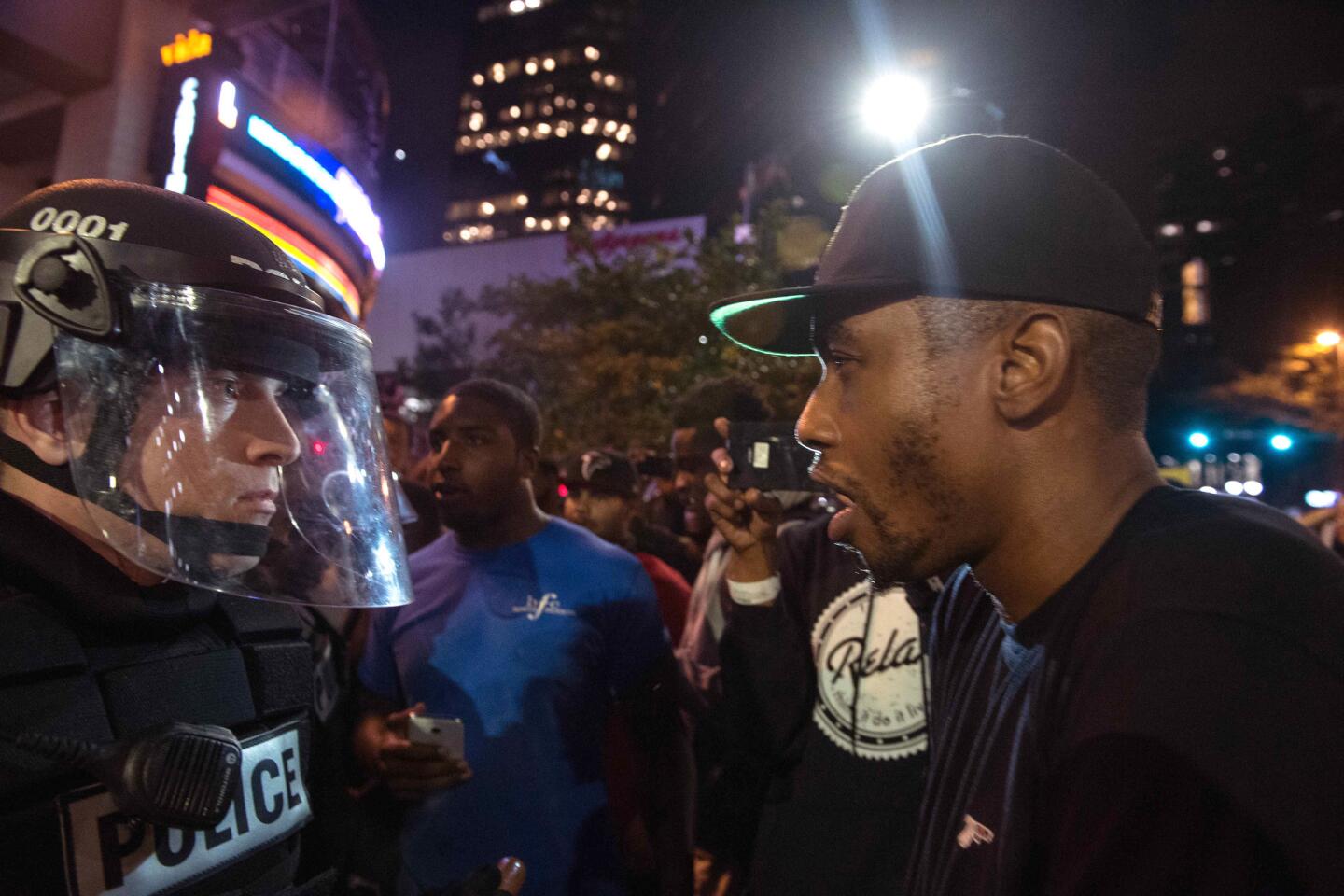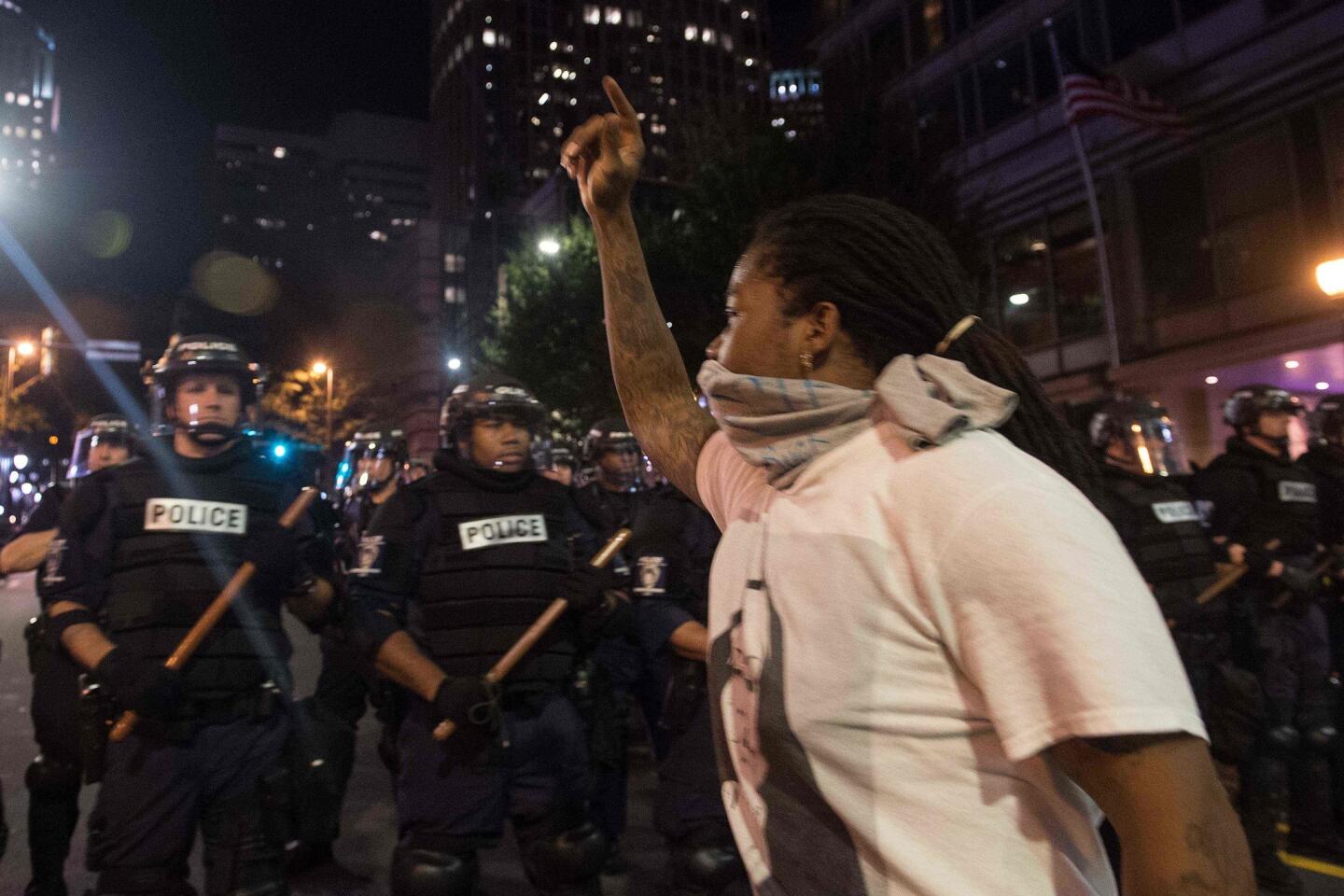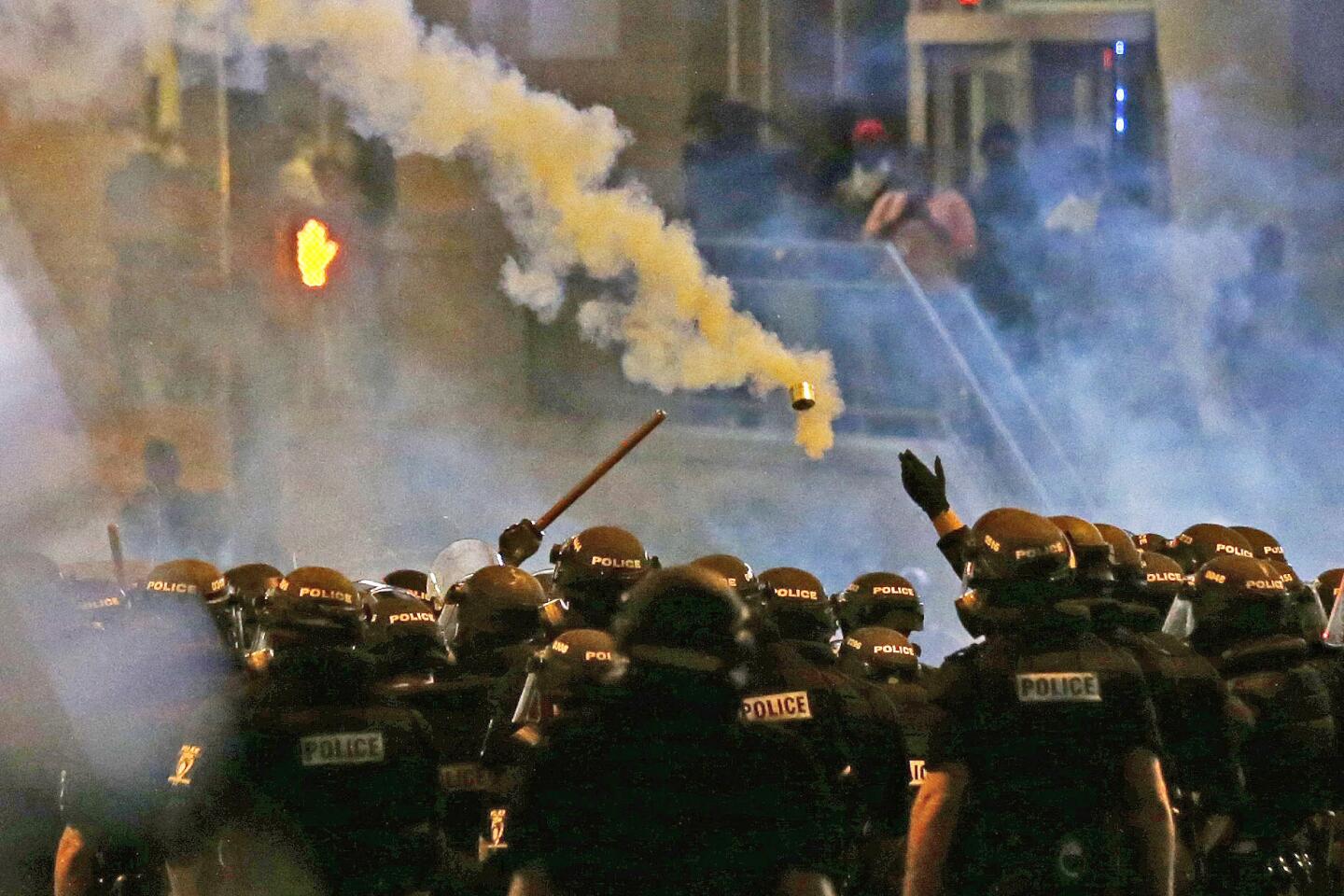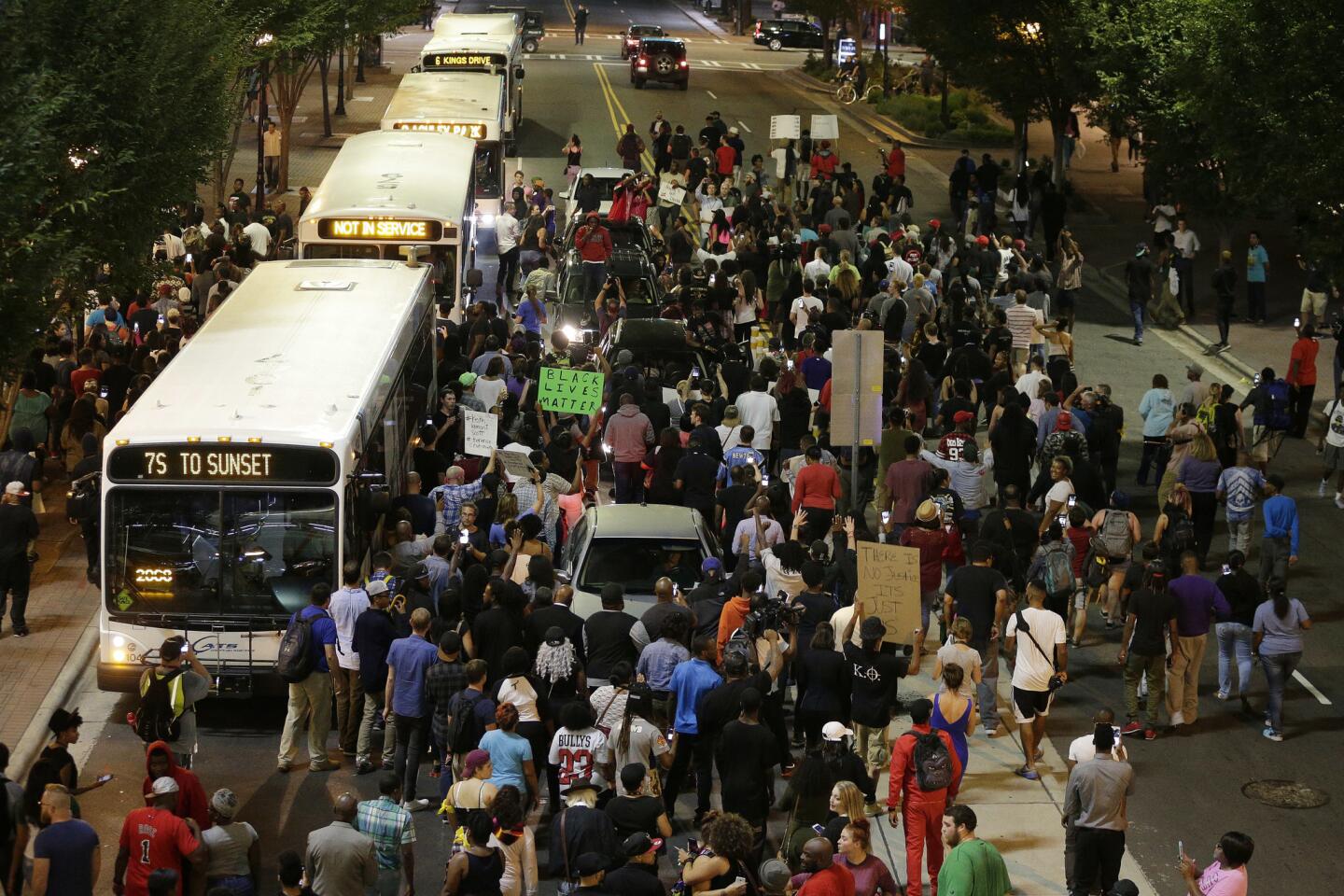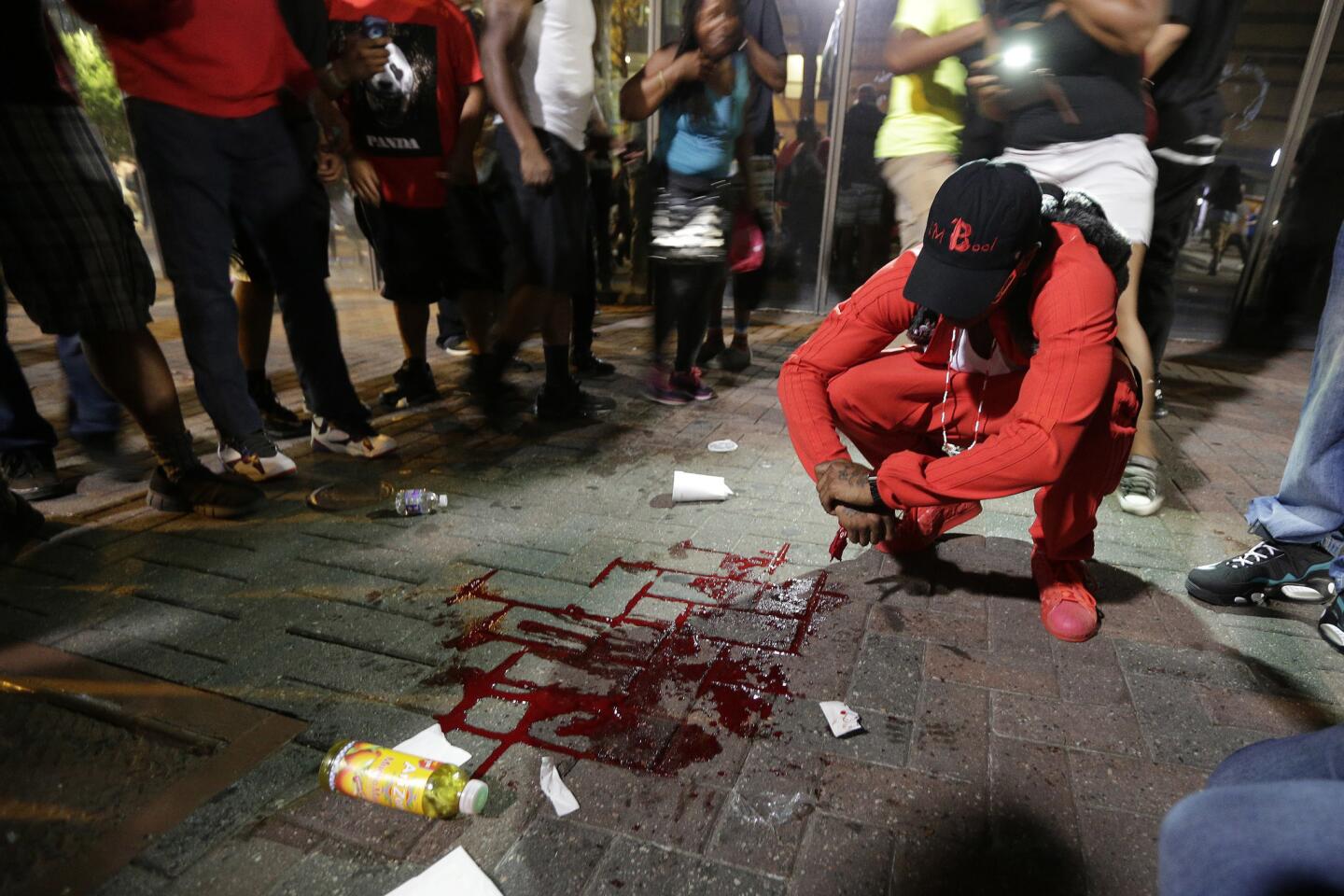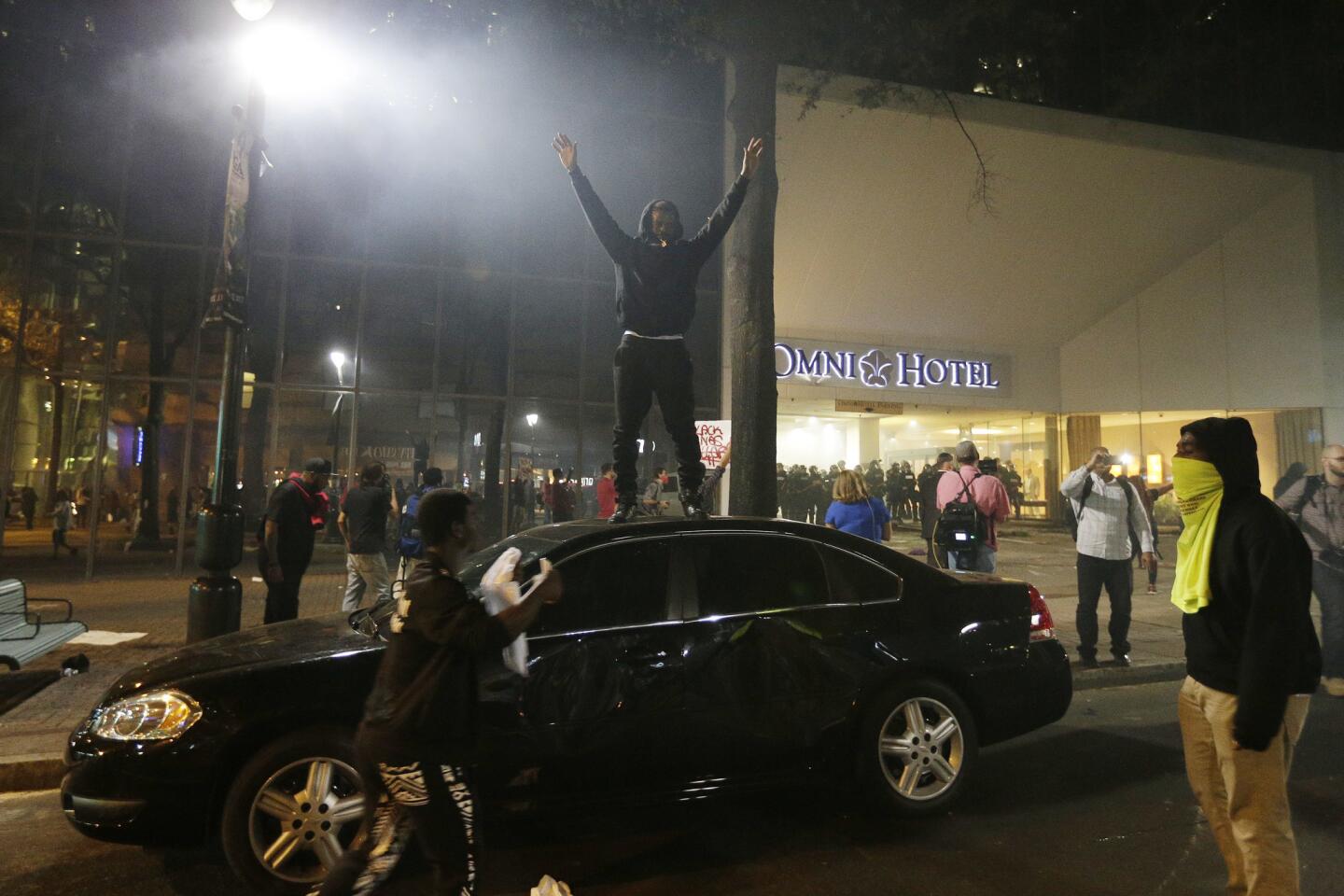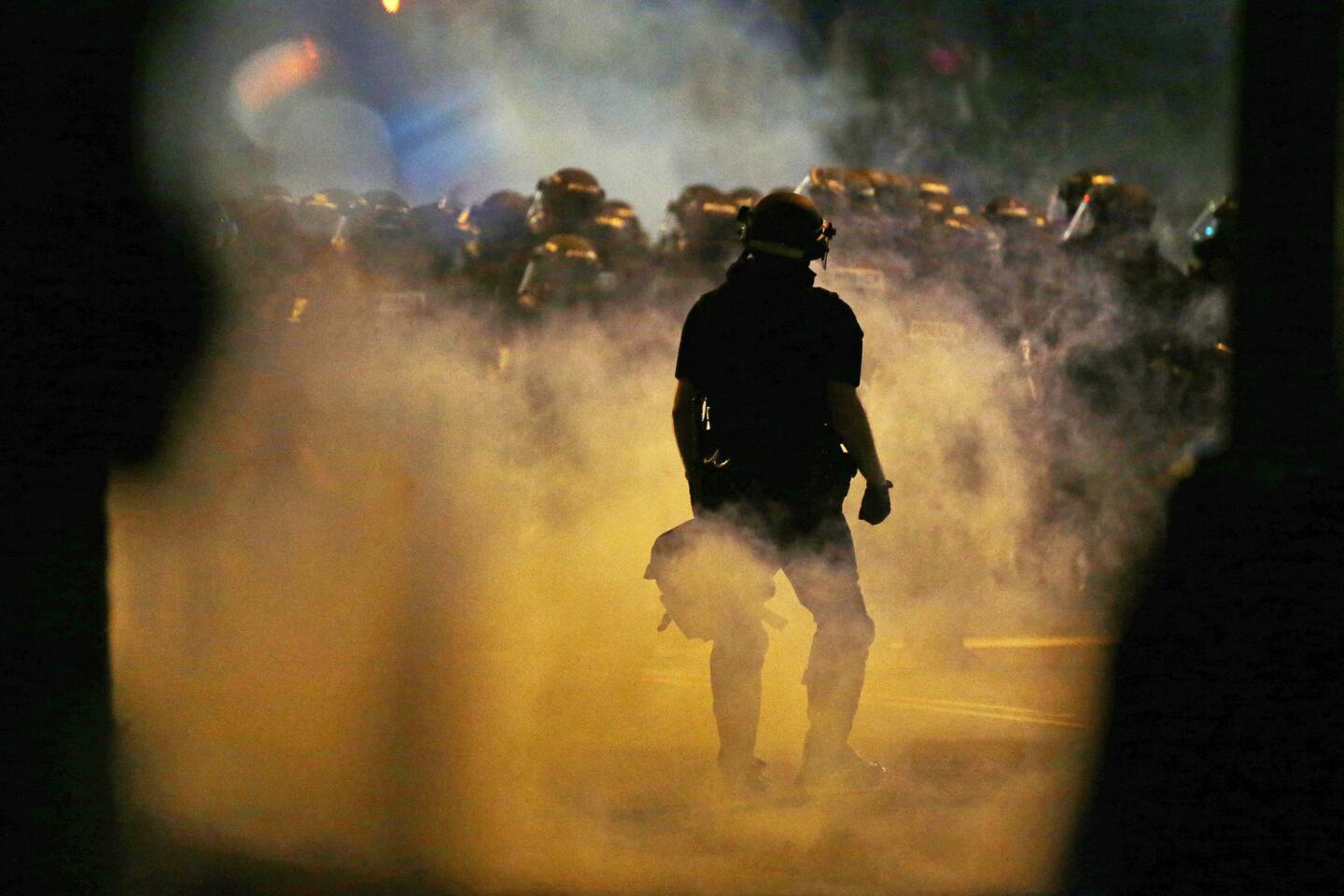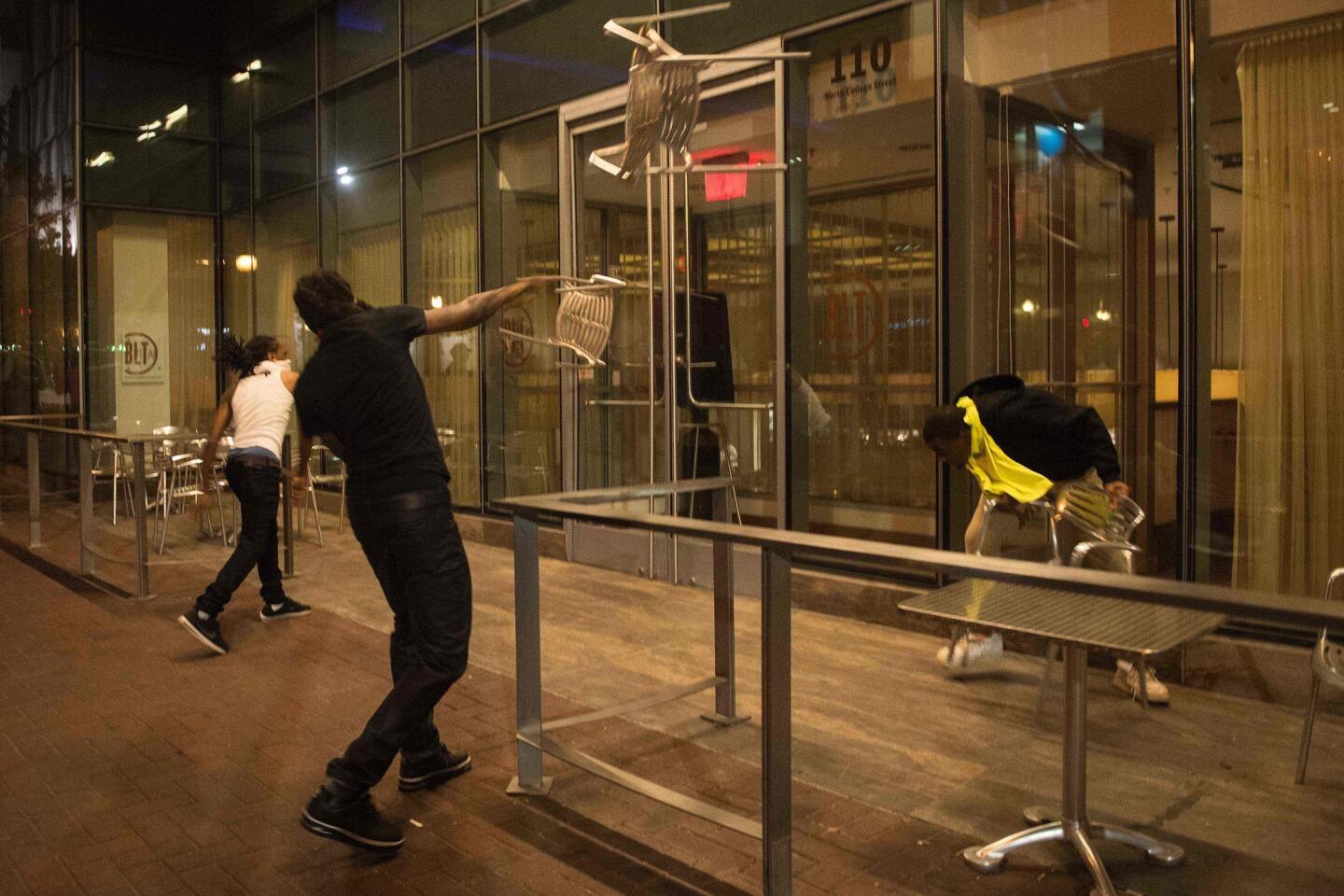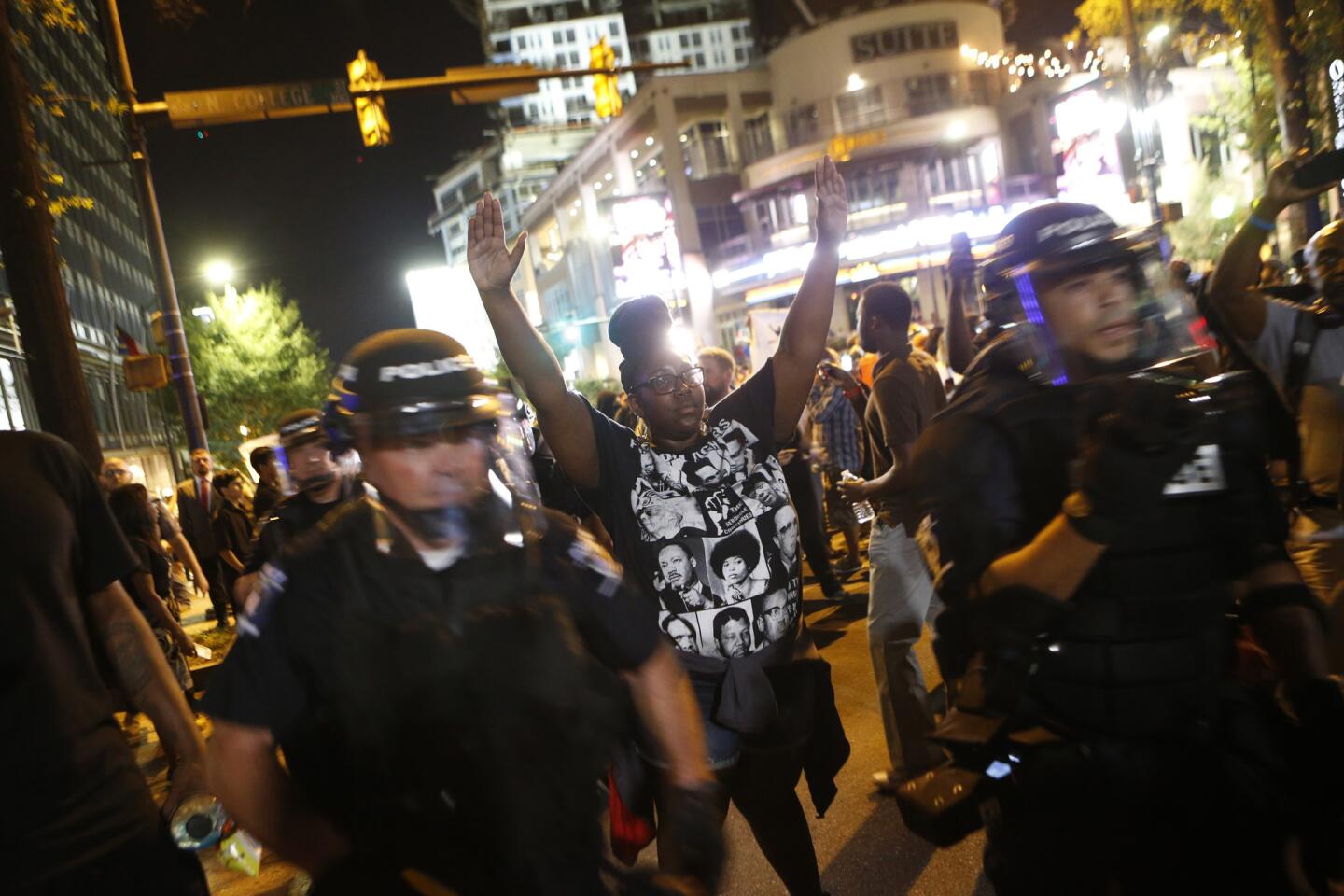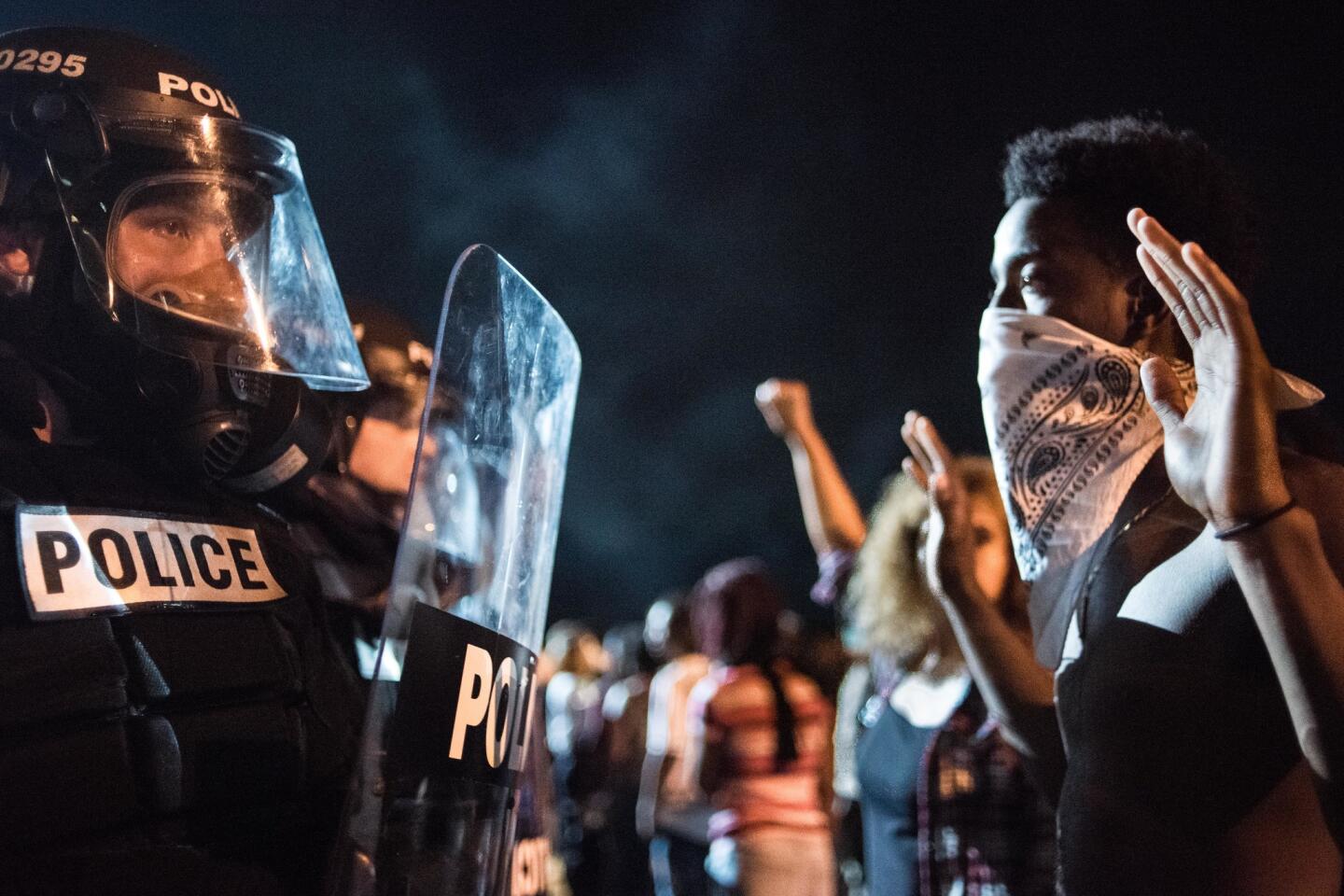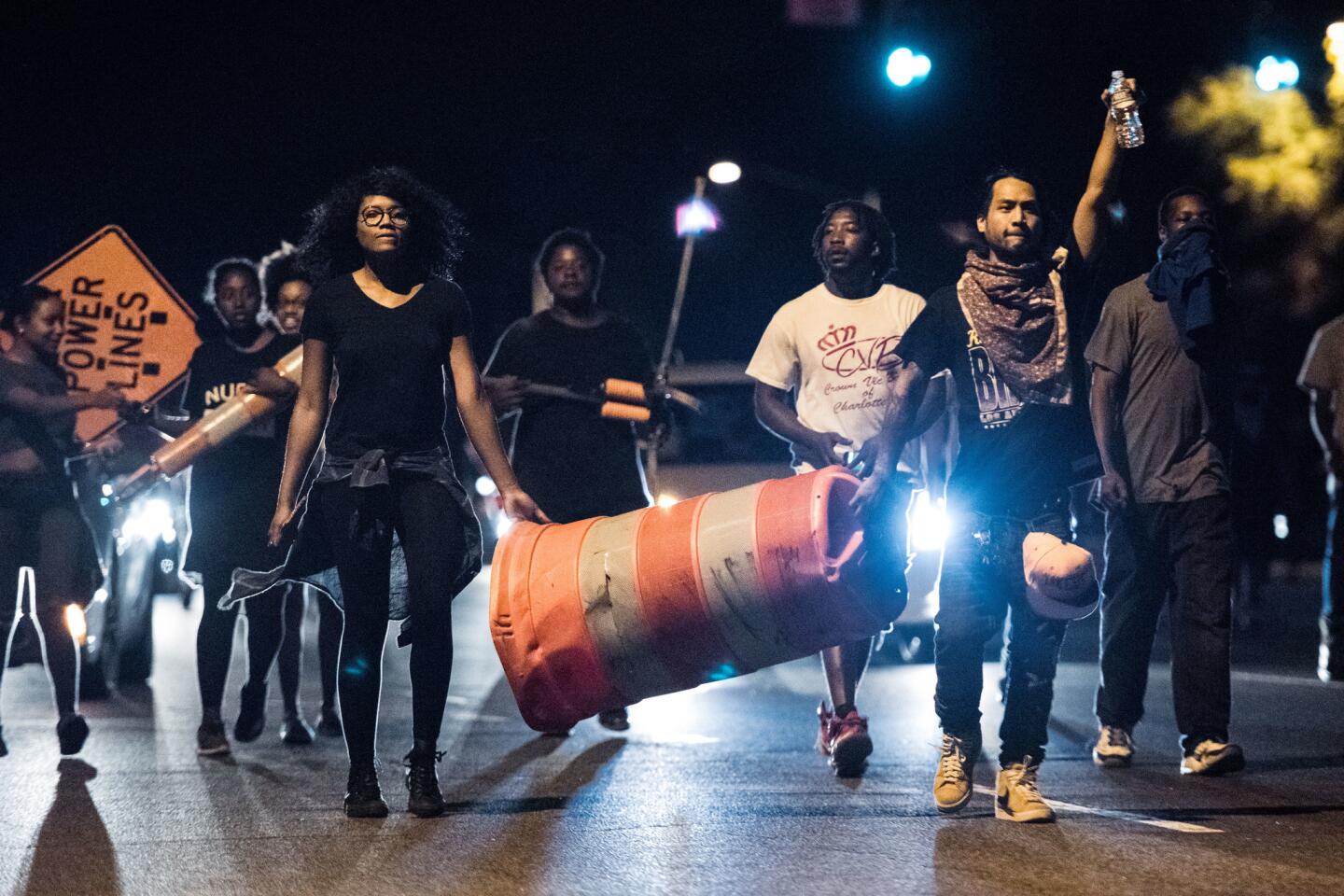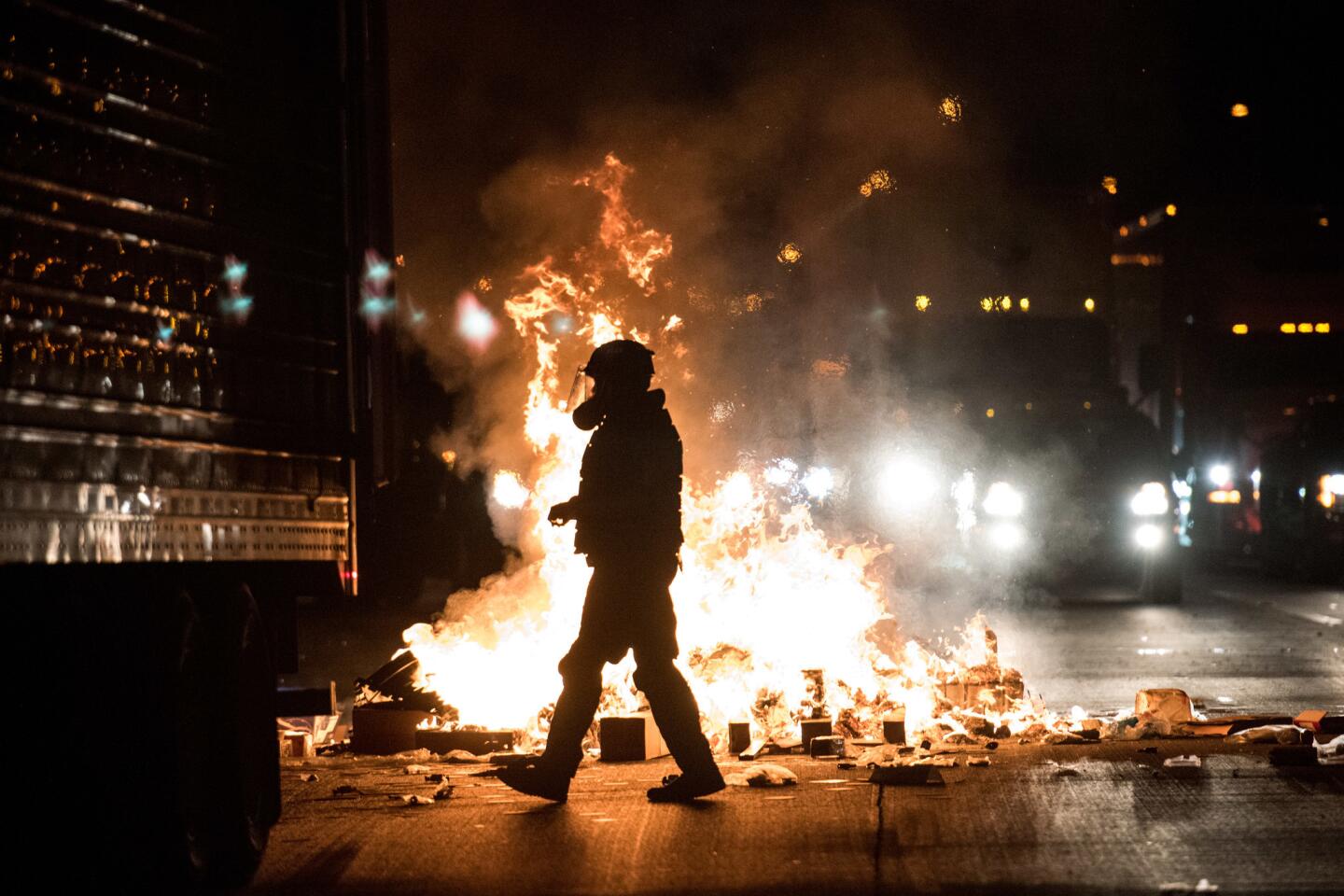Divisions deepen in Charlotte over police shooting

Protesters clashed with police late Tuesday and early Wednesday in Charlotte after an officer fatally shot a black man.
- Share via
Reporting from CHARLOTTE, N.C. — The fatal shooting by police of a 43-year-old black man has stoked long-simmering tensions over race and policing in this city, with its large African American population and high levels of segregation.
In some ways, the shooting of Keith Lamont Scott defies the narrative of police violence against black men that has inspired the Black Lives Matter movement. Charlotte, an embodiment of the New South, has a black police chief and a progressive political reputation. And the officer who shot Scott, according to authorities, is black.
For the record:
8:05 p.m. Sept. 21, 2016An earlier version of this article said the person shot at a protest Wednesday night had died. Authorities have since revised their earlier report to say that the victim survived but is in serious condition.
But the reaction of many in the city’s African American community has been visceral and sharply at odds with official accounts.
Activists and Scott’s family have disputed nearly every detail that has emerged about Tuesday’s shooting, leaving residents of North Carolina’s largest city grappling with two conflicting narratives.
One person was seriously injured Wednesday night after shots were fired during protests near the Ritz-Carlton hotel in downtown Charlotte, according to the Mecklenburg Emergency Medical Services Agency. Authorities said a civilian fired the shots.
Hotel managers closed the hotel and barricaded it with furniture, and police in riot gear fired tear gas at protesters and blocked streets.
Protests and vigils continued peacefully in other areas of the city Wednesday night, including near the site of Scott’s shooting and at local churches.
“This is a very difficult situation,” Mayor Jennifer Roberts said at a news conference earlier in the day as she and the police chief appealed for calm. Roberts promised a “transparent” investigation.
The refusal by police to quickly release video of the shooting may have undercut that promise in the eyes of many in the community who reject the police description of Scott as armed and threatening. Scott instantly joined a roll call of the names of black men fatally shot by police in the United States in recent months — and may have contributed to a shift in how those shootings are perceived.
“Blue-on-black violence is a better metaphor than white-on-black violence,” said Nirej Sekhon, an assistant professor of law at Georgia State University who has studied police shootings. “There tends to be a visceral reaction: ‘Oh, another white officer has shot another black man.’ But racism doesn’t really help account for these incidents. At least, I don’t think it’s the narrow, individualized brand of racism we typically imagine: a malevolent, white racist enacting violence on the black body.”
Police in Charlotte say 16 officers suffered minor injuries after protesters threw bottles and rocks at them through early Wednesday morning as demonstrators shut down an interstate highway, set ablaze cargo from stalled tractor-trailers, smashed police cruiser windows and looted a Wal-Mart.
Dozens of protesters were injured and one was arrested as police in riot gear dispersed tear gas through crowds gathered near the site of Scott’s death in a northeast neighborhood close to the University of North Carolina at Charlotte.
“It’s time to change the narrative, because I can tell you from the facts that the story’s a little bit different as to how it’s been portrayed so far, especially through social media,” said Charlotte-Mecklenburg Police Chief Kerr Putney, who said protesters were reacting to falsehoods.
Family members say Scott had an unspecified disability and was reading a book in his truck on Tuesday afternoon as he waited for his elementary-school-aged son to get off a bus near the entrance to an apartment complex. They say he was unarmed.
Some witnesses say a white officer shot Scott with no provocation as he got of of his truck, while police say it was a black officer who shot him after Scott refused to let go of a gun as he opened his door.
Brentley Vinson, the officer police identified as having shot Scott, has been put on routine administrative leave, Putney said.
Police say Vinson was at a University City apartment complex looking for a suspect with an outstanding warrant -- not Scott -- but happened upon him shortly before 4 p.m. Scott got out of the truck with a gun, according to police, then got back in the truck. Police said that they told Scott to drop the gun but that he got back out of the vehicle with the gun and “posed an imminent deadly threat” before the officer shot him.
Scott was pronounced dead at a hospital. Putney said a gun -- but no book -- was recovered from the truck.
“Whatever they are saying, it’s wrong,” said Scott’s mother, Vernita Walker, who lives in Charleston, S.C. Walker said Scott had seven kids, and described him as a “family man.”
Another woman, who described herself as Scott’s daughter, broadcast over Facebook from the police scene at the complex after the shooting. In a post that went viral and was laced with profanities directed at police, she said that her father was disabled and that his shooting was unjust. The woman, whose video garnered more than 500,000 views, did not reply to a request for an interview.
In a statement, Scott’s wife, Rakeyia Scott, said she has more “questions than answers” about the shooting after hearing police statements, and she called for peace.
“We respect the rights of those who wish to protest, but we ask that people protest peacefully. Please do not hurt people or members of law enforcement, damage property or take things that do not belong to you in the name of protesting,” the statement said.
The ACLU of North Carolina called on police to release any dashboard-camera or body-camera videos of the shooting, and the U.S. Department of Justice said it was aware of the shooting. Charlotte has a body-camera program for police, but the officer who shot Scott was in plainclothes and not wearing a body camera, Putney said. He added that there is dash-cam video that would not be released, citing a controversial North Carolina law passed in recent months that prohibits police from releasing video without a court order.
On Wednesday, mourners and activists gathered near the site of the shooting to speak against police statements from earlier in the morning and to call on residents to rise up against a “virus” among officers. They also called for a boycott of white-owned businesses.
“We’re not going to be doing marches. It’s all about fighting the system and getting rid of these dirty cops that’s inside. You’ve got a virus; you need some chemotherapy to get that virus and that cancer out. There’s some cops who have that same mentality in Charlotte,” said John Barnett of True Healing Under God (T.H.U.G.), a civil rights group, who said he was in touch with Scott’s family.
“What color is the officer?” Barnett shouted at one point, as a crowd yelled back, “White!”
“He had a book. Stop giving him a gun that doesn’t exist,” yelled a woman in the crowd.
Residents and activists said that the unrest in response to the shooting was not about one shooting alone. The city, a Southern headquarters for the banking industry and national nonprofit groups, is known for a strong African American middle class but also is among the state’s most segregated cities, with large pockets of poverty among minorities.
Black residents make up 34% of the city’s population, which is 44% white.
Charlotte is still reeling from a high-profile police shooting in September 2013, when an officer fatally shot a 24-year-old unarmed black man, Jonathan Ferrell, after he crashed his car in a neighborhood a few miles from where Scott died. A white officer hit Ferrell with 10 bullets; police said Ferrell had ignored officer commands.
A jury deadlocked in the officer’s trial last year, and the state said it would not retry him. Ferrell’s family settled a $2.25-million civil lawsuit with the city.
Residents have long complained about mistreatment from police. In a force led by a Putney, a black chief, the issues are also bigger than race, activists said.
“Black people can also be complicit” in police shootings, said Ashley Williams, a 23-year-old Charlotte activist who is involved in the Movement for Black Lives and is helping organize actions in response Scott’s death. “We acknowledge the police-industrial complex as inherently anti-black. Folks’ participation in that perpetuates anti-blackness.”
Dwight Mullen, a political science professor who studies African American communities at University of North Carolina in Asheville, criticized Charlotte’s police for their relationship to the black community.
“The police force has become more diverse, and you’d think that would take it into a more positive direction,” Mullen said. “It’s not enough. What we find is often the mechanisms that are being taken over by black officials encourage the black officials to repeat the behaviors of the people who preceded them.”
Amid criticism, the Police Department, which is nearly 76% white and 17% black and also oversees unincorporated parts of Mecklenburg County, has undertaken diversity initiatives and outreach efforts with African American communities since Ferrell’s death.
Putney, who was appointed last year as chief, has said previously that the department needs to overcome a “racist and bigoted history.”
“We’ve got to get through this,” he said as he delivered a sermon at a Charlotte church in July. “We’ve got to confront some difficult things. We’ve got to stop sugarcoating everything.”
But speaking at a forum on race and policing over the summer -- in the wake of a string of shootings of black Americans across the country and protests that ensued -- he also cautioned against prejudging officers.
“Even now when I see blue lights, it hits me in the stomach. I’ve had that reaction since I was 8 years old,” Putney said. “But what you don’t know is I’m sometimes more fearful when I put this uniform on. I’m going to tell you a secret: I’m always black -- I was born that way, I’m gonna die that way, but I chose to put myself in harm’s way with the honorable people who wear these uniforms to protect the people who need us most.”
Times staff writer Kaleem reported from Charlotte and special correspondent Jarvie from Atlanta.
ALSO
Anger grows in Tulsa as police release video of fatal shooting of unarmed black man
$1.9-million settlement in Sandra Bland death is the latest big payout in police-misconduct lawsuits
UPDATES:
6:45 p.m.: Updated to reflect that the person shot during the protest has died.
6:15 p.m.: Updated with person shot during protest.
5:05 p.m.: This article has been revised throughout for additional details and for clarity.
12:10 p.m.: This article was updated with more information throughout and comment from the attorney general and ACLU.
2:30 a.m., Sept. 21: This article was updated saying protesters were on the highway.
10:05 p.m.: This article was updated with information from the scene of the protest.
This article was originally published at 8:10 p.m. Sept. 20.
More to Read
Sign up for Essential California
The most important California stories and recommendations in your inbox every morning.
You may occasionally receive promotional content from the Los Angeles Times.
